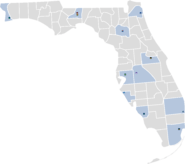Florida A&M University
Florida Agricultural and Mechanical University (FAMU) is a public, historically black university in Tallahassee, Florida. Founded in 1887, it is located on the highest geographic hill in Tallahassee. It is the 5th largest historically black university in the United States by enrollment and the only public historically black university in Florida.[4] It is a member institution of the State University System of Florida, as well as one of the state's land grant universities, and is accredited to award baccalaureate, master's and doctoral degrees by the Commission on Colleges of the Southern Association of Colleges and Schools.
FAMU | |
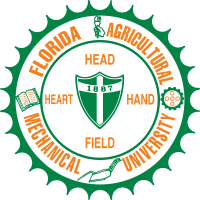 | |
Former names | Florida Agricultural and Mechanical College for Negroes (1909–1953) State Normal and Industrial College for Colored Students (1891–1909) State Normal College for Colored Students (1887–1891) |
|---|---|
| Motto | Excellence With Caring |
| Type | Public, HBCU Land-grant |
| Established | October 3, 1887 |
| Endowment | $113.1 million (2016)[1] |
| President | Larry Robinson |
Academic staff | 630 |
| Students | 10,031 (fall 2018)[2] |
| Location | , , United States 30°25′04″N 84°17′04″W |
| Campus | Urban 422 acres (1.7 km2)[3] |
| Colors | Orange and Green |
| Athletics | NCAA Division I – MEAC |
| Nickname | Rattlers and Lady Rattlers |
| Affiliations | State University System of Florida Urban 13 APLU TMCF |
| Mascot | Venom the Rattlesnake |
| Website | www |
The 2020 edition of the U.S. News & World Report college rankings placed the university in Tier 1 among "national universities" (254th), 7th among all HBCUs and 2nd among all public HBCUs.[5] The university is classified as an R2 Doctoral Research University under the Carnegie Classification of Institutions of Higher Education, which denotes higher research activity.[6] For 2017, the National Science Foundation ranked Florida A&M University 216th nationally and 2nd among HBCU for total research and development expenditures.[7]
FAMU sports teams are known as the "Rattlers", and compete in Division I of the NCAA. They are a member of the Mid-Eastern Athletic Conference (MEAC).
History
Abolitionist Jonathan C. Gibbs first introduced legislation to create the State Normal College for Colored Students in 1885, one year after being elected to the Florida Legislature. The date also reflects the new Florida Constitution of 1885, which prohibited racial integration in schools. The college was located in Tallahassee because Leon County and adjacent counties led the state in African-American population, reflecting Tallahassee's former status as the center of Florida's slave trade. (See History of Tallahassee, Florida#Black history.) The site of the university is the 375-acre slave plantation[8]:94 of Florida governor William Pope Duval, whose mansion, today the site of the Carnegie Library, burned in 1905.

On October 3, 1887, the State Normal College for Colored Students began classes, and became a land-grant college four years later when it received $7,500 under the Second Morrill Act, and its name was changed to State Normal and Industrial College for Colored Students. However, it was not an official institution of higher learning until the 1905 Buckman Act, which transferred control from the Department of Education to the Board of Control, creating what was the foundation for the modern Florida A&M University. This same act is responsible for the creation of the University of Florida and Florida State University from their previous institutions. In 1909, the name of the college was once again changed, to Florida Agricultural and Mechanical College for Negroes, and in 1953 the name was finally changed to Florida Agricultural and Mechanical University. Florida A&M is the only publicly funded historically black college or university in the state of Florida.[9]

In 1951, the university started a pharmacy and nursing program. In order to give these students hands-on experience, the university built a hospital. Until 1971 Florida A&M Hospital was the only one within 150 miles (240 km) of Tallahassee to serve African Americans.[10][11] It closed in 1971, after then-Tallahassee Memorial Hospital started serving African Americans.
On May 26, 1956, Wilhemina Jakes and Carrie Patterson, two Florida A&M University students, were arrested by the Tallahassee Police Department for "placing themselves in a position to incite a riot" which lead to the Tallahassee bus boycott which sought to end racial segregation in the employment and seating arrangements of city buses.
In 1963, FAMU students demonstrated against segregation in the city.[12]
In 1992, 1995, and 1997, FAMU successfully recruited more National Achievement Scholars than Harvard.[13][14][15]
In the fall of 1997, FAMU was selected as the TIME Magazine-Princeton Review "College of the Year" and was cited in 1999 by Black Issues in Higher Education for awarding more baccalaureate degrees to African-Americans than any institutions in the nation.[16][17]
In 2011 Robert Champion, a band member, was beaten to death in a hazing incident. Two faculty members resigned in connection with a hazing investigation and 13 people were charged with felony or misdemeanor hazing crimes;[18] one student, a band member, was convicted of manslaughter and hazing charges and sentenced to six years in prison.[19] The scandal resulted in the resignation of FAMU's president and played a role in the university's regional accreditor, the Southern Association of Colleges and Schools, placing FAMU on probation for one year.[20][21][22]
In 2019, FAMU and other HBCUs developed a partnership with Adtalem Global Education and its for-profit Ross University School of Medicine in Barbados.[23]
Presidents
- Thomas Desaille Tucker 1887–1901
- Nathan B. Young 1901–1923
- William A. Howard 1923–1924
- John Robert Edward Lee 1924–1944
- J.B. Bragg April 5, 1944 – September 1, 1944
- William H. Gray, Jr. 1944–1949
- H. Manning Efferson July 7, 1949 – April 1, 1950
- George W. Gore 1950–1968
- Benjamin L. Perry, Jr. 1968–1977
- Walter L. Smith 1977–1985
- Frederick S. Humphries 1985–2001
- Henry Lewis III January 2002 – June 2002
- Fred Gainous 2002–2004
- Castell V. Bryant January 2005 – May 2007
- James H. Ammons July 2, 2007 – July 16, 2012
- Elmira Mangum April 1, 2014 – September 15, 2016
- Larry Robinson November 30, 2017 – Present, May 2007 - July 2007, July 2012 – April 2014, September 2016 – November 2017
Academics
The university offers 54 bachelor's degrees, 29 master's degrees, one professional degree, and 12 doctoral degrees.[24] It has 12 schools and colleges.[25] Florida A&M also has an honors program for high-achieving undergraduate students who meet the high performance criteria.[26] FAMU is a member school of the Thurgood Marshall Scholarship Fund.[27]
In 2012, FAMU implemented the Medical Scholars Program (MSP) in partnership with the Charles E. Schmidt College of Medicine. MSP is a rigorous pre-medical program designed to uniquely prepare academically talented undergraduate students for success in medical school and beyond. There is a cap of 10 freshmen accepted into this competitive four-year program each year.[28]
FAMU has nine fully funded, endowed, eminent-scholars chairs, including two in the School of Journalism and Graphic Communications, four in the School of Business & Industry, one in the College of Education, one in Arts and Sciences, and one in its School of Pharmacy.[29]
Admissions
The Fall 2018 incoming freshmen class had an average GPA of 3.5 and an average SAT score of 1111.[2]
Demographics
| Student Body[30] | Florida[31] | U.S. Census[32] | |
|---|---|---|---|
| African American | 83.3% | 16.9% | 13.4% |
| Asian American | 0.99% | 2.9% | 5.8% |
| European American | 8.13% | 54.1% | 60.7% |
| Hispanic American | 3.51% | 25.6% | 18.1% |
| Multiracial American | 2.95% | 2.1% | 2.7% |
| Native American | 0.08% | 0.5% | 1.3% |
| International students | 0.80% | N/A | N/A |
Florida A&M University student enrollment population consists primarily of undergraduates. 84.1% of the school's enrolled students are African-American. The next largest demographic group is White (non-Hispanic) students at 7.71%. Native Americans, Hispanics and Asian Americans round out the remaining 8.19%.[33]
Accreditation
Florida A&M University has been accredited by Southern Association of Colleges and Schools (SACS) since 1935.[20]
Graduation rate
In 2019, FAMU’s four-year-graduation rate was about 22 percent. Its six-year graduation rate was 50 percent. .[34]
Rankings
| University rankings | |
|---|---|
| National | |
| U.S. News & World Report[35] | 254 [36] |
FAMU's School of Architecture and Engineering Technology is tied with seven other architecture-related schools in the No. 1 ranking by bachelor's degree production for African Americans by Diverse Issues in Higher Education.[37]
The Princeton Review recently named FAMU among its "2016 Best Colleges: Region-by-Region" list, ranking FAMU as one of the 140 "Best Southeastern" colleges and universities.[38]
FAMU was recognized in 2015 by the Building Green Initiative as the No. 2 "Greenest" public HBCU in the nation. In releasing its rankings, the initiative celebrated FAMU for its sustainability efforts via its agriculture and recycling programs, citing that the University has an "innovative approach to solving modern sustainability issues."[38]
College Choice ranked FAMU 5th among HBCUs its 2018 list.[39]
College of Pharmacy and Pharmaceutical Sciences
The School of Pharmacy was organized in 1951. It received its present name in 1985 in recognition of the expanded role and mission of the college in professional and graduate education. It is now one of the largest colleges of pharmacy in the country.[40] It offers a Doctor of Pharmacy Degree (PharmD) and also a PhD program in Pharmacy. The fall PharmD enrollment was 1,068, and FAMU has produced over 20% of the nation's African-American pharmacists.[41] The Pharmacy School in 2009–2010 graduate student enrollment was 122, with 42 PhDs, 21 DrPH, 45 MPH and 14 MS candidates. The school has graduated over 60% of African-American PhDs in pharmaceutical sciences, since 1990.[41] It is accredited by the Accreditation Council for Pharmacy Education (ACPE).[42]
College of Engineering
College of Law
On December 21, 1949, a division of law was established at the then Florida A&M College, and the first class was admitted in 1951. The legislature established the school because no "separate but equal" state-supported law school existed for African Americans at that time.[43] The school's enrollment was limited to African-American male students and was located in Tallahassee, Florida.[43] The FAMU law school was closed through a vote by the Florida legislature in 1965, with the funds transferred to a new law school at Florida State University; vindictiveness for FAMU activism in support of desegregation was a factor.[44] The College of Law reopened in 2002 and now occupies its own 160,000-square-foot (15,000 m2) building at 201 Beggs Avenue in downtown Orlando with an onsite College of Law Library that is open to the general public. The four-story building was designed by Rhodes+Brito Architects of Orlando. The new building opened to students in 2005. Of the 1,807 who applied to the school in 2009, 630 were accepted and 234 enrolled.[43][45] Seventy-seven percent of the entering class were Florida residents, and 42% were non-minority students. The Florida Bar Exam cumulative pass rate for July 2019 was 61.1 percent.[46]
Research
FAMU's annual research funding is $44.5 million.[47] The University has access to research funding from many Federal agencies.[48] FAMU's two largest research areas are agriculture and health sciences. The Pharmacy College's research funding is $20.2 million ($20.2 million in federal, $300k in state support, and from $300k in private industry support) with $29,281,352 committed.[49]
Campus
FAMU's main campus is in Tallahassee, Florida, just south of the State Capitol and the campus of Florida State University. It also has a law school campus in Orlando, Florida, and the Research and Development Center in Quincy, Florida. The College of Pharmacy has extension campuses in Miami, Jacksonville, Tampa and Crestview, Florida.[40]
Residential facilities
FAMU requires all first-year students to live on campus, if their families are over 35 miles (56 km) from the FAMU campus. Exceptions to this rule include married students, students with dependents, and students who are of age 21 by the start of classes.[50]
FAMU offers a limited number of rooms for students with dependent families.[50] Family households may occupy rooms in the Palmetto North Apartments.[51] Residents are zoned to Leon County Schools.[52] Residents are zoned to Bond Elementary School,[53] Nims Middle School,[54] and Leon High School.[55]
National historic district
Florida Agricultural and Mechanical College Historic District | |
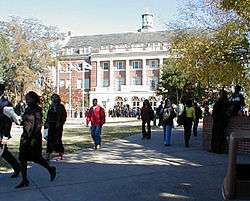 FAMU campus, Lee Hall | |
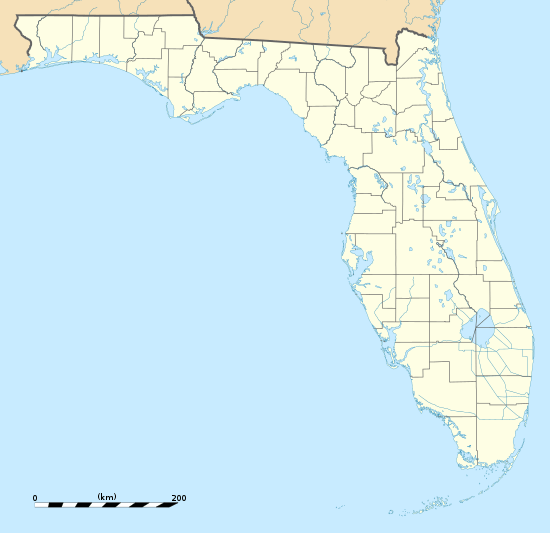  | |
| Location | Tallahassee, Florida |
|---|---|
| Area | 370 acres (1.5 km2) |
| Built | 1907 |
| Architect | William Augustus Edwards; Rudolph Weaver, et al. |
| Architectural style | Colonial Revival, Classical Revival |
| NRHP reference No. | 96000530[56] |
| Added to NRHP | May 9, 1996 |
The Florida A&M Tallahassee Campus consists of 132 buildings spread across 420 acres (1.7 km2). Part of the campus is listed on the U.S. National Register of Historic Places as the Florida Agricultural and Mechanical College Historic District. It received that designation on May 9, 1996. The district is centered along the section of Martin Luther King Boulevard that goes through the campus. According to the National Register, it covers 370 acres (1.5 km2), and contains 14 historic buildings and 1 object. One campus building, the old Carnegie Library, is listed separately on the National Register.[56] On April 18, 2012, the AIA's Florida Chapter placed Lee Hall at Florida Agricultural & Mechanical University (FAMU) on its list of Florida Architecture: 100 Years. 100 Places.[57]
Research centers
The FAMU Research and Development Center in Quincy, Florida, serves students in animal science, pre-veterinary medicine and veterinary technology. In May 2009, a new New Animal Healthcare Complex opened to support FAMU's pre-veterinary program. The complex was funded by a $1.2 million grant from the United States Department of Agriculture (USDA) Cooperative Extension Research.[58]
Other research centers include the following:[29]
- The Sustainability Institute
- The Center for Viticulture and Small Fruit Research
- The Center for Plasma Science and Technology
Libraries
The Samuel H. Coleman Memorial Library is the University's main library, named for the man who served as the University's general alumni president for 14 years. After the University's main building containing administrative offices, cafeteria, and library were destroyed by fire, Andrew Carnegie donated a $10,000 gift for the construction of a new library facility. The construction of Coleman Library began during the post-World War II era. The new library was officially dedicated during FAMU's 1949 annual Founders Day celebration in honor of civil leader Samuel H. Coleman.[59] The library was built in 1948, renovated in 1972, expanded in 1990 and again in 2004. The 88,964 square feet (8,265.0 m2) facility includes study rooms, a student study lounge and cafe, graduate and faculty study carrels, teleconference rooms, and a state-of-the-art information literacy classroom.[60]
Along with the additional 20,000 square feet (1,900 m2) available in the branch libraries, the Florida A&M University Libraries provide a seating capacity of 920. The Libraries hold nearly 2 million volumes, over 155,000 e-books and e-journals, and 256,126 microforms, which are readily accessible to users and support both onsite and online programs.[60]
Carnegie Library
In 1907, when the city of Tallahassee turned down philanthropist Andrew Carnegie's offer of a library building, because by his rules it would have had to serve black patrons, Carnegie funded instead the Carnegie Library at FAMU. It no longer serves as a library, but instead houses the Southeastern Regional Black Archives Research Center and Museum.
Athletics
Florida A&M University is a member of the Mid-Eastern Athletic Conference and participates in NCAA Division I-AA. In June 2020, FAMU announced they will be joining the Southwestern Athletic Conference in summer 2021.[61] FAMU's sports teams are called the "Rattlers." FAMU offers men's sports in baseball, basketball, cross country, football, golf, tennis and track and field. It offers women's sports in basketball, bowling, cheerleading, cross country, softball, tennis, track and field and volleyball.[62]
From 1938 to 1961, the football team won the Black College National Championship eight times, including six times under head coach Jake Gaither, in 1950, 1952, 1954, 1957, 1959 and 1961. When Gaither retired after 25 years of coaching in 1969, his FAMU teams had a 203-36-4 (wins-losses-ties) record, for a .844 winning percentage. Thirty-six players from Gaither's teams were All-Americans, and 42 went on to play in the National Football League. During his 25 years as head coach, FAMU won 22 Southern Intercollegiate Athletic Conference championships. Gaither was elected to the College Football Hall of Fame in 1975. FAMU went on to win the first NCAA D1-AA National Championship in 1978 after defeating the University of Massachusetts Amherst.
The men's basketball team has qualified for the opening round game of the NCAA men's basketball tournament three times (1999, 2004 and 2007). The FAMU Wrestling Team placed third in their region and had several national placers in 2008 under Coach Sharif.
Student life
FAMU is the fifth largest HBCU in the nation with a student body of nearly 10,000 students hailing from all regions of the United States and several foreign countries. Individuals part of the FAMU community are affectionately referred to as "FAMUly" or members of "Rattler Nation".[63][64] FAMU has over 100 student organization on campus.[65]
Notable student organizations
Student Government Association
The Student Government Association (SGA) is the official voice of the student body and is divided into three branches: Executive, Judicial, and Legislative.[66]
FAMU Royal Court
Miss FAMU, Mister FAMU, and other students represent the university in its royal court. Miss FAMU, Mister FAMU, and female students known as “attendants”, are elected by the student body; there is a Freshman, Sophomore, Junior, Senior and Graduate attendant. The male “escorts” of the attendants are appointed by Mister FAMU through an application process. The attendants and escorts are undergraduate students, except for one attendant and one escort who are graduate students.[67]
Gospel Choir
The FAMU Gospel Choir was established in 1957.
Reserve Officers Training Corps
FAMU is home to both Army ROTC and Naval ROTC units, permitting students to pursue careers as commissioned officers in the U.S. Army, U.S. Navy, and U.S. Marine Corps, upon graduation. For those FAMU students desiring to become commissioned officers in the U.S. Air Force, a cross-campus arrangement permits their taking Air Force ROTC training with the AFROTC detachment at nearby Florida State University (FSU). Likewise, Florida State students desiring to become Navy and Marine Corps officers may also enroll with FAMU's NROTC unit under a similar arrangement.
Marching band
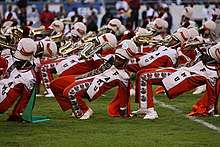
The FAMU marching band, The Marching 100, received national recognition in January 1993 when it performed in the 42nd Presidential Inauguration Parade by invitation of Bill Clinton. The band has also performed in the Super Bowl and in the 44th Presidential Inauguration Parade for Barack Obama. In 2019, the marching band performed in the Rose Parade in Pasadena, California on New Year's Day.
Student media
- The FAMUAN – The student newspaper[68]
- Journey Magazine – The student magazine[69]
- FAMU 20 TV – The FAMU TV news broadcast network[70]
- WANM 90.5 FM – The university owned and operated radio station.[71]
References
- "U.S. and Canadian Institutions Listed by Fiscal Year 2016 Market Value of Endow" (PDF). NACUBO. Archived from the original (PDF) on 2017-02-15. Retrieved 24 March 2017.
- http://www.famu.edu/oir/2018-19%20Fact%20Sheet_Aug_13_2019.pdf
- "About FAMU - Florida Agricultural and Mechanical University 2018". Famu.edu.
- "Largest Historically Black Colleges (PHOTOS)". The Huffington Post. Retrieved 29 July 2015.
- "Overview". Usnews.com. Retrieved 28 January 2019.
- Rattler, Big (12 January 2016). "Rattler Nation: FAMU climbs to R2, second highest research category in Carnegie Classifications". Rattlernation.blogspot.com.
- "NSF – NCSES Academic Institution Profiles – Rankings by total R&D expenditures". Ncsesdata.nsf.gov. Archived from the original on 2017-01-13. Retrieved 2019-01-28.
- Federal Writers' Project (1993). McDonogh, Gary W. (ed.). The Florida Negro. A Federal Writers' Project Legacy. University Press of Mississippi. ISBN 0878055886.
- "About Florida Agricultural and Mechanical University". Florida Agriculture and Mechanical University. Retrieved 6 May 2014.
- "FAMU Hospital". floridamemory.com. Retrieved February 14, 2014.
- "News Headlines - Florida Agricultural and Mechanical University 2015". Famu.edu. 2006-12-07. Retrieved 2015-09-22.
- Pillow, Travis (November 9, 2013). "Senator recalls role in protest". Florida Today. Melbourne, Florida. pp. 10B. Retrieved November 11, 2013.
- "Phenomenal growth – Black Issues in Higher Education's sixth annual Top 100 rankings of minority baccalaureates – Cover Story". Diverseeducation.com. Retrieved 29 July 2015.
- "Famu Gets Most Talented Black Scholars - tribunedigital-sunsentinel". Articles.sun-sentinel.com. 1996-01-12. Retrieved 2015-09-22.
- Rose (January 25, 1998). "Ongoing Famu Excellence - tribunedigital-orlandosentinel". Articles.orlandosentinel.com. Retrieved 2015-09-22.
- "CNN - Time survey names Florida A&M 'College of the Year' - Aug. 24, 1997". Cnn.com. Retrieved 29 July 2015.
- "About FAMU - Florida Agricultural and Mechanical University 2015". Retrieved 29 July 2015.
- "Death of Florida A&M's Robert Champion ruled a homicide". BBC News. December 17, 2011. Retrieved 16 December 2011.
- "Convictions upheld in hazing death of FAMU drum major". Miami Herald. November 18, 2016. Retrieved November 30, 2019.
- Gary Finout (December 11, 2012). "Scandals threaten FAMU's accreditation". Associated Press. Archived from the original on December 19, 2012. Retrieved December 19, 2012.
- Lederman, Doug (December 12, 2012). "Headline-Driven Accreditation". Inside Higher Ed. Retrieved June 14, 2019.
- "Southern Accreditor Clears Virginia, Fisk, Florida A&M". Inside Higher Ed. December 11, 2013. Retrieved December 24, 2013.
- "Florida A&M links pathway agreement with Barbados-based Ross University School of Medicine". Tallahassee Democrat. February 18, 2019. Retrieved 29 June 2019.
- "School of Graduate Studies and Research- Florida Agricultural and Mechanical University2019". Famu.edu.
- "Academics- Florida Agricultural and Mechanical University2019". Famu.edu.
- "Department of Honors Program - Florida Agricultural and Mechanical University 2016". Famu.edu.
- Mauro Catenacci. "About Historically Black Colleges And Universities (HBCUS) - Thurgood Marshall College Fund - Thurgood Marshall College Fund". Retrieved 29 July 2015.
- "Medical Scholars Program - Florida Agricultural and Mechanical University 2016". Famu.edu.
- "About FAMU - Florida Agricultural and Mechanical University 2016". Famu.edu.
- "Florida A & M University 2017-2018 Fact Book" (PDF). Famu.edu. Retrieved 28 January 2019.
- "U.S. Census Bureau QuickFacts: Florida". Census.gov.
- "U.S. Census Bureau QuickFacts: UNITED STATES". Census.gov.
- "Enrollment Summary, 2016–2017 factbook" (PDF). FAMU. Retrieved 2017-10-26.
- {{cite web|url=https://www.tallahassee.com/story/news/2019/09/09/famu-florida-a-m-moves-up-no-7-among-top-hbcus-u-s-news-report-best-colleges-2020-rankings]}
- "Best Colleges 2020: National University Rankings". U.S. News & World Report. Retrieved September 8, 2019.
- "Overview". Usnews.com. Retrieved 28 January 2019.
- "Top 100 Producers of Minority Bachelor's Degrees, 2017". Diverseeducation.com.
- "FAMU Receives Top Honors from Ranking Organizations". Famunews.com. 5 November 2015.
- "Best Historically Black Colleges and Universities". Collegechoice.net. 1 April 2017.
- "Overview". Archived from the original on 2010-06-09. Retrieved 2009-12-31.
- "Fact Sheet". Archived from the original on 2010-06-09. Retrieved 2009-12-31.
- Pharmacy, FAMU. "Accreditation". pharmacy.famu.edu.
- Kay, Julie (Jan 1, 2010). "Saving the School". American Bar Association Journal. Retrieved 2009-12-31.
- Haughney, Kathleen; Deslatte, Aaron (December 24, 2011). "Scott, FAMU rift only the latest incident in rocky 50-year relationship", (Fort Lauderdale)". Sun-Sentinel. Retrieved July 4, 2015.
- "1L Class Profile". Archived from the original on 2010-02-03. Retrieved 2009-12-31.
- https://webcache.googleusercontent.com/search?q=cache:YBBEVfHv8ZEJ:https://www.bizjournals.com/tampabay/news/2019/09/17/see-how-florida-law-schools-performed-on-the-july.html+&cd=9&hl=en&ct=clnk&gl=us
- "Florida A & M University 2017-2018 Fact Book" (PDF). Famu.edu. Retrieved 28 January 2019.
- "Funding Opportunities". FAMU Dision of Research. Retrieved November 30, 2019.
- "College of Pharmacy and Pharmacuetical Sciences : Current Contracts and Grants : As of 9/24/2015" (PDF). Pharmacy.famu.edu. Retrieved 28 January 2019.<
- "Frequently Asked Questions." Florida A&M University. Retrieved on October 2, 2011.
- Mitchell, Marri (March 17, 2010). "Families find housing on campus". thefamuanonline.com. Archived from the original on April 4, 2012. Retrieved October 2, 2011.
- "Campus Map." Florida A&M University. Retrieved on October 2, 2011. Palmetto North consists of buildings 152 to 160, in the lower right area of the map.
- "Leon County Elementary School Zoning 2009–2010 School Year Archived 2012-03-30 at the Wayback Machine." Leon County Schools. Retrieved on August 15, 2011.
- "Leon County Middle School Zoning 2009–2010 School Year Archived 2014-07-11 at the Wayback Machine." Leon County Schools. Retrieved on August 15, 2011.
- "Leon County High School Zonin" (PDF). Leon County Schools. Archived from the original (PDF) on July 11, 2014. Retrieved August 15, 2011.
- "National Register Information System". National Register of Historic Places. National Park Service. January 23, 2007.
- "Florida Architecture: 100 Years. 100 Places". THE FLORIDA ASSOCIATION OF THE AMERICAN INSTITUTE OF ARCHITECTS. Retrieved 27 April 2012.
- "Ribbon-Cutting for New Animal Healthcare Complex". Retrieved 2009-12-31.
- Guthrie, Ana (2012). "The History of Florida's Four FBCU (Historically Black Colleges & Universities) Libraries". Florida Libraries. 55 (2): 41.
- "FAMU Libraries: About Us". FAMU Libraries. Retrieved 30 October 2015.
- https://hbcugameday.com/2020/06/03/famu-bot-moves-with-caution-and-excitement-toward-swac-move/
- "Florida A&M - Official Athletics Website". Florida A&M. Retrieved 2020-03-04.
- "About Us". Famulyaffairandmore.com.
- "Rattler Nation". Rattlernation.blogspot.com.
- "Efferson Student Union & Activities". Studentactivities.famu.edu. Retrieved 18 November 2018.
- III, John Presha. "SGA Leaders". sga.famu.edu. Retrieved 18 November 2018.
- "Florida A & M Continues to Honor A Regal Tradition". Tallahassee Magazine. 2018-01-03. Retrieved 2019-07-18.
- "Florida A&M (thefamuanonline) News and Classifieds". Thefamuanonline.com.
- "Journey Magazine – Florida A&M University's Campus Magazine". Jmagonline.com.
- "Arizona's Top Daycare, Locksmith, and Manufacturer Reviews". Famutvnews.com.
- "Student Media". Famunews.com. 8 October 2013.
External links
![]()
